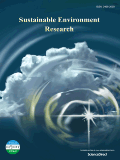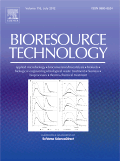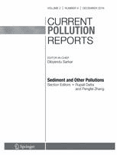
REVIEWS IN ENVIRONMENTAL SCIENCE AND BIO-TECHNOLOGY
Scope & Guideline
Pioneering Solutions for a Greener Tomorrow
Introduction
Aims and Scopes
- Environmental Biotechnology:
The journal emphasizes the application of biotechnological methods to address environmental issues, including the degradation of pollutants and the treatment of waste. - Sustainable Resource Management:
Research on sustainable practices for resource recovery from waste materials, including the valorization of agricultural and food waste, is a key focus area. - Climate Change Mitigation:
The journal addresses strategies and technologies aimed at mitigating climate change effects through carbon capture, bioenergy production, and ecosystem management. - Microbial Ecology and Bioremediation:
It explores the role of microbial communities in bioremediation processes, highlighting their potential in environmental restoration and waste treatment. - Innovative Technologies for Waste Treatment:
The journal covers advancements in technologies for wastewater treatment, solid waste management, and pollution control, including the use of nanomaterials and bioprocessing. - Plant-Microbe Interactions:
Research on the interactions between plants and microorganisms, particularly in enhancing plant health and soil fertility, is a significant area of focus.
Trending and Emerging
- Circular Bioeconomy:
An increasing number of studies are focusing on circular bioeconomy practices, emphasizing the conversion of waste into valuable products and sustainable resource management. - Carbon Sequestration and Utilization:
Research on carbon capture, utilization, and mineralization is gaining traction as a critical area for addressing climate change, showcasing innovative approaches to reducing atmospheric CO2. - Microalgae and Cyanobacteria Applications:
There is a growing interest in the use of microalgae and cyanobacteria for bioremediation, bioenergy production, and food security, reflecting their versatility and potential. - Advanced Waste Treatment Technologies:
Emerging technologies such as electrospinning nanomaterials and hybrid processes for wastewater treatment are increasingly featured, indicating a trend towards innovative solutions. - Plant-Microbe Interactions in Stress Conditions:
Research focusing on the role of plant growth-promoting microbes in enhancing plant resilience to abiotic and biotic stresses is becoming more prevalent, highlighting its relevance in agriculture.
Declining or Waning
- Traditional Wastewater Treatment Methods:
There has been a noticeable decrease in publications focusing on conventional wastewater treatment methods, as researchers are increasingly exploring innovative and integrated approaches. - Single-Use Plastics and Their Treatment:
Research specifically targeting the treatment of single-use plastics has diminished, possibly due to a broader focus on circular economy practices and bioplastics. - Chemical Methods for Pollution Control:
The emphasis on chemical treatments for pollution control appears to be waning, with a shift towards biological and ecological methods gaining more attention. - Agricultural Pesticide Remediation:
Studies specifically addressing the remediation of agricultural pesticides in isolation are less frequent, reflecting a broader integration of agricultural practices with environmental sustainability. - Microbial Fuel Cells:
Research on microbial fuel cells has decreased, possibly as newer technologies and methods for energy recovery and waste treatment emerge.
Similar Journals

ENVIRONMENTAL ENGINEERING SCIENCE
Pioneering research for a sustainable future.ENVIRONMENTAL ENGINEERING SCIENCE is a leading journal published by MARY ANN LIEBERT, INC that provides a platform for pioneering research in the fields of environmental chemistry, pollution control, and waste management. With an ISSN of 1092-8758 and an E-ISSN of 1557-9018, this peer-reviewed journal aims to disseminate high-quality scientific studies that address critical environmental challenges. As evidenced by its 2023 category quartile rankings, it holds a notable position at Q3 in Environmental Chemistry and Pollution and Q2 in Waste Management and Disposal, highlighting its relevance and impact in these domains. Spanning over two decades from 1997 to 2024, the journal is dedicated to fostering innovations and promoting rigorous scholarship that can contribute significantly to sustainable environmental practices globally. Authors and researchers are encouraged to engage with this essential resource, which offers Open Access options to enhance the visibility and reach of their work. For those interested in advancing their understanding and practice within the environmental sciences, ENVIRONMENTAL ENGINEERING SCIENCE is an indispensable journal to consider.

Detritus
Championing open-access knowledge for a sustainable world.Detritus, an esteemed open-access journal published by CISA PUBLISHER since 2018, serves as a vital platform for the dissemination of innovative research in the fields of Environmental Chemistry, Environmental Engineering, and Waste Management and Disposal. Based in Padova, Italy, the journal aims to foster scholarly communication and collaboration among researchers, professionals, and students dedicated to advancing our understanding of environmental challenges and solutions. With its open-access model, Detritus ensures that high-quality research is freely available, bridging the information gap within the scientific community. While currently categorized in the Q3 quartile across multiple environmental science disciplines, the journal is poised to further enhance its visibility and impact, contributing significantly to pressing global issues such as waste reduction and sustainable resource management. As the journal continues to evolve, it encourages submissions that advance theory and application in these critical areas.

BIOTECHNOLOGY LETTERS
Transforming Ideas into Impactful Biotechnological SolutionsBIOTECHNOLOGY LETTERS is a prestigious peer-reviewed journal that has been at the forefront of biotechnology research since its inception in 1979. Published by Springer, this esteemed journal serves as a vital platform for disseminating cutting-edge research in the fields of applied microbiology, bioengineering, and biotechnology, with a focus on innovative methodologies and technologies. With an impact factor reflecting its critical contribution to the discipline, BIOTECHNOLOGY LETTERS resides in the Q2 and Q3 tiers of various scientific categories, placing it among the notable journals in the biotechnological landscape. Although it offers traditional access options and does not feature open access, the journal embraces a global readership, encouraging submissions from researchers, professionals, and students eager to explore the dynamic advancements in biotechnology. Situated in the Netherlands, it continues to shape the future of the field through relevant, impactful research that addresses contemporary challenges and opportunities in medicine and beyond.

Sustainable Environment Research
Advancing sustainability through innovative research.Sustainable Environment Research, an esteemed journal published by BMC, serves as a pivotal platform for disseminating innovative research in the fields of Environmental Engineering, Pollution, and Renewable Energy. Established in 2016 as an Open Access journal, it facilitates the widespread sharing of knowledge and advancements across the globe, reflecting its commitment to enhancing environmental sustainability. With an impressive Q1 ranking in multiple categories, including Water Science and Technology and Pollution, the journal is recognized for its significant impact, currently holding a rank of 31st in Environmental Science - Water Science and Technology. The journal actively invites researchers, professionals, and students to contribute to crucial discussions around sustainable practices and technologies, thus addressing worldwide environmental challenges. Based in Taiwan but accessible internationally, Sustainable Environment Research provides a valuable resource for those dedicated to advancing the science of sustainability.

Engenharia Sanitaria e Ambiental
Championing open access to transformative research.Engenharia Sanitaria e Ambiental is a distinguished journal published by the Associação Brasileira de Engenharia Sanitária e Ambiental and has been an influential resource in the fields of sanitation and environmental engineering since its inception. With an Open Access format established in 2004, it ensures that invaluable research is freely accessible to a global audience, supporting the dissemination of knowledge and innovation. Based in Brazil, the journal addresses critical issues surrounding waste management and environmental sustainability, contributing significantly to the discourse in these areas. Although currently ranked in Q4 within its category as of 2023, it serves as a platform for emerging research and aims to elevate the standards of environmental science education and practice. Researchers, professionals, and students alike benefit from its commitment to enhancing the understanding of sanitary and environmental challenges, making it an essential resource for those striving to contribute to a healthier and more sustainable world.

BIODEGRADATION
Leading the way in biodegradation science for a healthier planet.BIODEGRADATION is a leading academic journal published by Springer that focuses on the interdisciplinary study of the degradation of organic compounds and its implications for environmental health and sustainability. Operating since 1990, BIODEGRADATION has established itself as a pivotal resource in the fields of bioengineering, environmental chemistry, environmental engineering, microbiology, and pollution management, currently ranking in the Q2 quartile across these categories as of 2023. With an ISSN of 0923-9820 and an E-ISSN of 1572-9729, the journal disseminates high-quality, peer-reviewed research, engaging both seasoned researchers and emerging scholars interested in the mechanisms and applications of biodegradation processes. While the journal operates under a subscription model, it continues to attract significant interest due to its comprehensive coverage of innovative methodologies and critical analysis of biodegradation pathways and their environmental significance. As a beacon in its field, BIODEGRADATION not only addresses contemporary issues in environmental science but also fosters academic conversation and collaboration amongst researchers globally, making it an indispensable asset for those dedicated to advancing sustainability practices.

BIORESOURCE TECHNOLOGY
Exploring Sustainable Pathways for a Greener TomorrowBioresource Technology, published by Elsevier Science Ltd, is a leading journal in the fields of bioengineering, environmental engineering, and sustainable resource management. With an impressive impact factor reflected in its Q1 rankings for 2023 across multiple relevant categories, it stands out as a premier source for groundbreaking research from its inception in 1991 to its anticipated contributions through 2024. Bioresource Technology promotes the advancement of technologies and methodologies aimed at the sustainable utilization of biological resources, playing a pivotal role in tackling the challenges of waste management, renewable energy, and environmental protection. Researchers and practitioners are encouraged to contribute and engage with high-quality studies that have significant implications for the global push towards sustainability and innovation. Although the journal does not currently offer Open Access, its subscription model ensures that the rigorous peer-reviewed content remains accessible to those dedicated to advancing the field.

Waste Management
Leading the way in sustainable waste practices and research.Waste Management, published by Pergamon-Elsevier Science Ltd, stands as a premier journal in the field of waste management and disposal, reflecting its esteemed position with an impressive 2023 impact factor and ranking in the Q1 category. This journal is pivotal for researchers, professionals, and students, offering a rich repository of innovative studies and methodologies aimed at addressing the increasingly critical challenges in waste management. With a dedicated focus on advancing knowledge and practice in environmental science, it encompasses a wide array of topics from waste reduction techniques to sustainable disposal strategies. Founded in 1983, Waste Management continues to be at the forefront of academic discourse, providing invaluable insights into both theoretical frameworks and practical applications, thus playing a vital role in shaping the future of waste disposal practices worldwide.

Asian Journal of Water Environment and Pollution
Fostering impactful discussions on water pollution management.Asian Journal of Water Environment and Pollution is a leading academic journal published by IOS PRESS, dedicated to advancing the field of water science and technology, as well as pollution management. With its ISSN 0972-9860 and E-ISSN 1875-8568, this journal serves as a pivotal platform for researchers, professionals, and academics alike who are keen to explore innovative solutions and interdisciplinary approaches toward water-related challenges and environmental issues. Although currently positioned in the Q4 category for both pollution and water science & technology, the journal aims to foster impactful research and discussions that can enhance the understanding and treatment of water pollution. The Asian Journal of Water Environment and Pollution not only plays a crucial role in disseminating knowledge but also encourages the sharing of findings from unique geographic perspectives, particularly from Asia. As the field evolves, this journal is poised to become a vital resource for those looking to contribute to sustainable water management practices and pollution reduction strategies.

Current Pollution Reports
Fostering Collaboration for a Sustainable PlanetCurrent Pollution Reports, published by Springer Heidelberg, is an esteemed journal in the field of environmental science, focusing on the multifaceted aspects of pollution, waste management, and water science. With an impressive 2023 impact factor reflected in its status as a Q1 journal across multiple categories—including Management, Monitoring, Policy and Law, Pollution, Waste Management and Disposal, and Water Science and Technology—this journal stands at the forefront of environmental research and policy discourse. The journal, which has been in publication since 2015, aims to provide a platform for scholars and practitioners to share their findings, promoting the exchange of innovative ideas and effective solutions to pressing environmental challenges. With its rigorous peer-review process, Current Pollution Reports serves as an invaluable resource for researchers, professionals, and students committed to understanding and addressing pollution and its impacts on our planet.